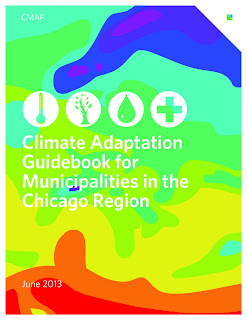Category:
Climate report predicts more weather extremes
May 9th, 2014 by iisg_superadminIn the news: Lakes Michigan, Huron on the rise
March 11th, 2014 by iisg_superadmin“This winter, the abundance of snow and near-record ice cover are the reasons for the rebound in water levels, according to Keith W. Kompoltowicz, a meteorologist with the Corps’ office in Detroit.
Snowfall around Lake Michigan is 30% higher than any time in the last decade, and ice cover on the lake is flirting with a record.On Tuesday, ice on Lake Michigan reached 92.45%, according to the Great Lakes Environmental Research Laboratory in Ann Arbor, Mich. That’s the second highest level since the record of 93.1% in 1977…But the winter of 2013-’14 can only have so much effect on the lakes. Water levels are cyclical and rise and fall due to a series of events over many months and years, Kompoltowicz said.Even if the next six months mirrors the rainy spring of 2013, Kompoltowicz said, Lake Michigan and Lake Huron might reach within a few inches of the lakes’ long-term average. The Corps doesn’t make predictions beyond six months.”
Award winning GO TO 2040 development plan features work from several IISGers
February 12th, 2014 by iisg_superadminNew climate adaptation toolkit helps municipalities
July 17th, 2013 by Irene MilesThe guidebook serves as a toolkit of sorts to help planners, administrators, and others formulate comprehensive plans and responses to current and future effects resulting from a changing climate. The guidebook addresses a number of water related issues and vulnerabilities, including flood protection and mitigation, meeting drinking water needs, and more.
In the news: Cities going green with water management options
June 13th, 2013 by Irene MilesCities throughout the U.S., especially those with aging infrastructure and water management issues, are implementing more and more green features in their planning. Some simple changes and additions can help reduce the burden on older systems, reducing issues of flooding, runoff, and more.
From The Atlantic Cities:
“Portland, Oregon, Washington, D.C., and Seattle are just some of the cities that have pioneered green infrastructure projects. In Philadelphia, the city will spend some $3 billion over 25 years on such infrastructure as part of its Green City, Clean Waters program.
In the Midwest, Indianapolis is leading the way. Stormwater planters and bioswales with native grasses run almost the entire length of the city’s Cultural Trail, a state-of-the-art bicycle and pedestrian route built over the past six years that wends its way for eight miles through the downtown streets of Indiana’s largest city.”
In the news: Acidification may harm the Great Lakes
March 4th, 2013 by Irene MilesCarbon dioxide is contributing to a change in the chemical makeup of the world’s oceans, which is known as ocean acidification. This process may make it more difficult for shellfish and coral to survive in this new environment. But the oceans may not be the only bodies of water threatened by this dangerous change.
From The Great Lakes Echo:
The increased carbon dioxide changing the water chemistry and ecology of oceans may also be affecting freshwater and the organisms that live in it.“Based on our preliminary modeling and understanding of carbon cycles, we think similar acidification trends will take place in the Great Lakes to the degree that researchers are expecting in the oceans,” said Galen McKinley, a professor of atmospheric and oceanic sciences at the University of Wisconsin.
Visit the Great Lakes Echo for the full article, which details potential impacts that these changes in water chemistry may have on the Great Lakes ecosystems.
Recent News
- Tomas Höök signing off as Illinois-Indiana Sea Grant director this summer
- Illinois-Indiana Sea Grant welcomes Stuart Carlton as the program’s new director
- Four Illinois and Indiana educators will set sail on Lake Michigan aboard EPA’s research ship
- Join IISG as a new pollution prevention outreach assistant
- Beach season means it’s time for lifesaving Lake Michigan water safety resources
IISG Instagram
Four science educators from Illinois and Indiana have been selected for the 2025 Shipboard Science Immersion on Lake Michigan July 7-13. The educators will spend a full week alongside researchers aboard the EPA research vessel Lake Guardian. Afterwards, they will bring Great Lakes science back to their classroom.
Learn more and meet the four incredible teachers representing Illinois and Indiana at the link in bio.

🌿 Educators—Explore Restoration in Action!
Join us Thursday, July 31 at Purdue Northwest (Hammond, IN) for a FREE full-day workshop diving into the transformation of the Grand Calumet River Area of Concern.
🚍 Tour restored sites
🧠 Engage with VR curriculum
📚 Earn 6 PD hours
🥐 Breakfast & lunch included
🔗 Register now at the link in bio and bring real-world science to your classroom.
Register by July 21st.

Attention STEM educators! Our new aquaponics curriculum is here! Designed for 9-12th grade classrooms with operating aquaponics systems, this curriculum, created by educators for educators, teaches STEM concepts through the lens of aquaponics, aligning with NGSS and Great Lakes Literacy Principles. Learn more at the link in bio.

Big news from Illinois‑Indiana Sea Grant! We’re thrilled to announce Dr. Stuart Carlton, our Assistant Director since 2018, will step into the Director role on July 14, 2025. Join us in congratulating Stuart, and read on at the link in bio to find out more about the transition!

Categories
- Aquaculture
- Aquatic Invasive Species
- Buoys
- Climate Ready Communities
- Director's Blog
- Education
- Featured
- Fellowships
- Fisheries
- Funded Research
- Funding
- Great Lakes Cleanup
- Great Lakes Data
- Healthy Waters
- Internships
- Jobs
- K-12 Education
- News
- Photos
- Program
- Recreation & Tourism
- Resources
- Sea Grant Scholars
- Stormwater & Green Infrastructure
- Sustainable Community Planning
- The Helm
- Uncategorized
- Video
- Water Resource Economics

